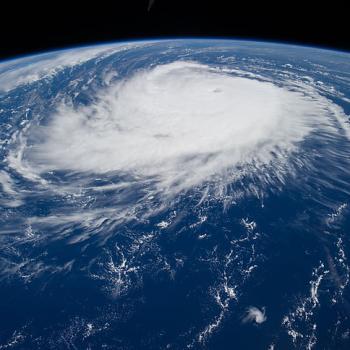
Every religion that I know of has an “end of the world” scenario. For that matter, secularists have end of the world scenarios too. Just this week an article was published claiming that the end of human civilization would come in 2050 as a result of complications from global warming. Christians have long believed that an imminent return of Christ would usher in a new age of peace. Of course, in most versions of the Christian apocalypse, the world descends into terrible darkness before the end comes.
What if, however, we have been reading this wrong? What if the world is not currently descending into despair and darkness before our very eyes. And what if the Bible’s version of the apocalypse can be read differently?
Contrary to what we would believe due to press accounts, the world is *not* getting worse. Consider the progress made against poverty. In 1820 only a tiny percentage of the world population had a lifestyle above what we would term “extreme poverty.” In 1950 fully two-thirds of the world lived in extreme poverty. By 1981 that number had been reduced to 42%. While that is a sea of teeming masses living in poverty and squalor, it is a vast improvement from the near total poverty of the 1820s. By 2015, the last year for which there is data, the world population in extreme poverty had been reduced to below 10%.
Consider literacy. In 1820 only about 10% of the world’s population was literate. Now it is about 85%. If current trends continue, by 2100 there will be almost 7 billion people with at least a secondary education.
Consider health. In 1800 43% of the world’s newborns died before their 5th birthday. That number is down to 4.3 percent.
Humans are becoming freer. Until the 19th century nearly everyone on earth lived in despotic, autocratic regimes. Today more than half of the people in the world live in a democratic state. Fully 80% of those who do not live in a democratic state live in one country: China.*
Further, we now live in more peaceful times. The wars we see now are smaller in scope and there are fewer casualties. The number of battle deaths in combat in 2016 was 87,432. By comparison, in 1950 there were over 500,000 combat deaths.**
So what does all of this mean? Well, there is much to celebrate in the human condition. We are better fed, we are living longer, we are better educated, and we are more peaceful than at any other time in recorded history.
On the other hand, we are bent on self-destruction. We struggle with pollution. We are destroying lives through addiction. Our moral fabric is coming unglued. How should we think of this?
In the Gospel of Luke 13, Jesus is pressed for an answer to the problem of evil. He is presented with a report of an atrocity, a report of a collapsed building, and a woman who was sick for 18 years. Near the conclusion of the chapter, Jesus tells one of His stories, a “Kingdom Parable.” He says, “What is the kingdom of God like? What shall I compare it to? It is like a mustard seed, which a man took and planted in his garden. It grew and became a tree, and the birds perched in its branches.” The message of the parable is that the Kingdom of God is like a small seed that grows into a tree. The tree provides safety for the birds. Meaning that the Kingdom of God will begin small and grow into something that can provide safety for those who would take shelter in it. The Kingdom of God is God’s way of transforming our world. It is slowly and steadily growing. It does not grow in perceptible ways. It grows as individuals accept the reign of God in their own lives and are changed. A famous Biblical scholar says it this way, the world is changed by the “colonizing influence of the Kingdom of God.” Wherever hearts are changed by the Gospel, people love their neighbors enough to try to make the world a better place.
This is not to say that the world cannot be plunged into darkness quickly. Ages of human progress and optimism are often brought to an end by calamities. The instinct to dominate and destroy is still prevalent.
I also do not want to suggest that all is well with the world. There is still suffering on a grand scale. I do not want to minimize the horrors of disease and persecution. What I am suggesting is that the idea that the world will keep getting worse until Jesus comes is not the only way to read the Bible and does not fit with our experience.
So the Christian belief, rooted in a careful reading of Jesus’ teachings and the book of Revelation, that the world is headed for calamity still holds. It is just a calamity that has not reached us yet.
*https://ourworldindata.org/a-history-of-global-living-conditions-in-5-charts
**https://ourworldindata.org/war-and-peace











